Want the true Whitby experience?
Ready to enroll? Apply Now
“The Lower School classrooms are vibrant and loving places of learning. We believe that students learn best when they are empowered and feel ownership in their classrooms.”
Your child's story continues in our Lower School, the part of the school that is home to Lower Elementary (Grades 1 and 2) and Grades 3 and 4.
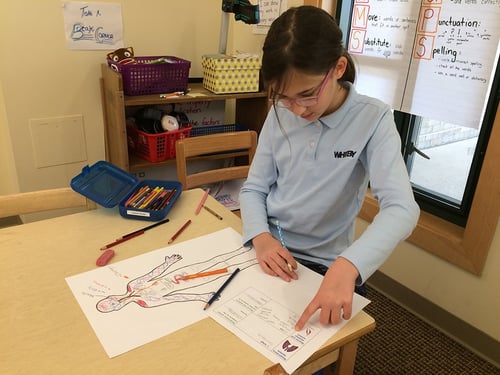 Lower School is a time filled with the excitement of having new teachers, studying new subject areas, going off-campus for field trips, performing in student assemblies, experimenting with various educational technologies, exploring big concepts in IB units of inquiry and making new friendships.
Lower School is a time filled with the excitement of having new teachers, studying new subject areas, going off-campus for field trips, performing in student assemblies, experimenting with various educational technologies, exploring big concepts in IB units of inquiry and making new friendships.
The Lower School classrooms are vibrant and loving places of learning. Students care about what they learn, they have a voice in their classrooms, posing questions of interest to them and bringing their individual strengths to the process. Through inquiry and exploration, the program engages students in their learning while continuing to build their fundamental skills in all subject areas. We believe that students learn best when they're empowered and feel ownership in their classrooms. This translates into a joy of and a passion for learning that explains why Whitby students love coming to school.
Assessment is an integral part of teaching and learning at Whitby. The word assessment stems from the latin word "assidere" which means "to sit beside." We view assessment as an opportunity "to sit beside" your child to help them understand where they are at in their progression of learning.
The use of rubrics is one way we help students assess themselves as learners. Rubrics are also used to guide teachers in their planning for learning engagements in addition to formal assessments. Students are provided rubrics at the beginning of each unit so they know what they're working towards and what "good" should look like. With this knowledge and understanding, they're empowered to achieve their goals.
If you've spent some time on our website, you might be thinking that student-centered learning sounds great – but what does it look like in real life? We're sure your doubts will evaporate the moment you see your child talking about their learning journey in our Student-led Parent-Teacher conferences.
Not only do our students attend Parent-Teacher conferences, they drive the conversation from start to finish summarizing their strengths and challenges as a learner and sharing their inspiration and success stories.
It will warm your heart, blow your mind – or maybe even both. Either way, you'll need to see this in action to believe it.
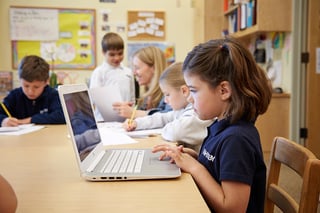
The way we plan and structure our curriculum in Lower School is why our students love to learn. Our approach and practice is founded in the belief that students learn best when they can see connections to big ideas, they can come to their own conclusions, they can construct meaning through inquiry and they are allowed to take risks.
We take this belief and create six conceptually based IB Units of Inquiry to provide opportunities for students to contextualize their learning, to make connections to other ideas and to inquire into the world around them. Students develop knowledge and understanding of big ideas, underpinned by traditional subjects like math, reading, writing, social studies and science. Instead of teaching traditional subject areas in isolation they are tied to bigger concepts making them more meaningful for the students.
You may be wondering how an IB Unit of Inquiry is used to contextualize learning. You can see a great example of how big concepts can be explored and leveraged across traditional subjects in our How the World Works unit.
During this unit, our Lower School students explore different forms of finite and renewable energy. They:
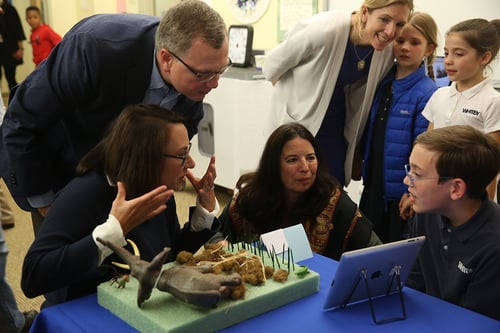
Students take action on their learning both in school and at home. The solar tubes in our recent four-classroom addition are a testament to the learning in Grade 4.

Elliot W Eisner, “The Role of the Arts in Cognition and Curriculum” (2001)
Visual arts, music and theater are all integral to learning at Whitby. They are a powerful mode of communication through which students explore and develop a much deeper understanding of self expression and perspective. Each one of these programs ignite opportunities for discussions on trust, respect, point of view, conflict and camaraderie.
Creative skills, verbal and nonverbal expression, empathy and aesthetic appreciation are all developed through our Visual Arts program. Students are encouraged to draw on their imagination, providing them with opportunities to communicate distinctive forms of meaning, develop their technical skills, take creative risks, solve problems and visualize consequences.
Our Music curriculum is designed to help students develop an understanding and appreciation of music, as well as acquire the practical skills needed, to cultivate a life-long source of enjoyment and personal satisfaction. Students learn music composition basics through various games, folk dances and rhythmic activities.
Individualized music lessons are also available through Whitby's Cocurricular Program.
The art of "walking in another's shoes" is a cornerstone of Whitby's Grades 3 and 4 Theater Program. It transports students, builds their self-confidence, tears down inhibitions, channels experience into communication and enhances articulation.
By analyzing character histories, relationships and objectives, students begin to identify and establish different perspectives on both historical and current issues. Through text analysis, students begin to uncover the role of fairness and justice in different global contexts. And through improvisation, students work together to find solutions to problems.
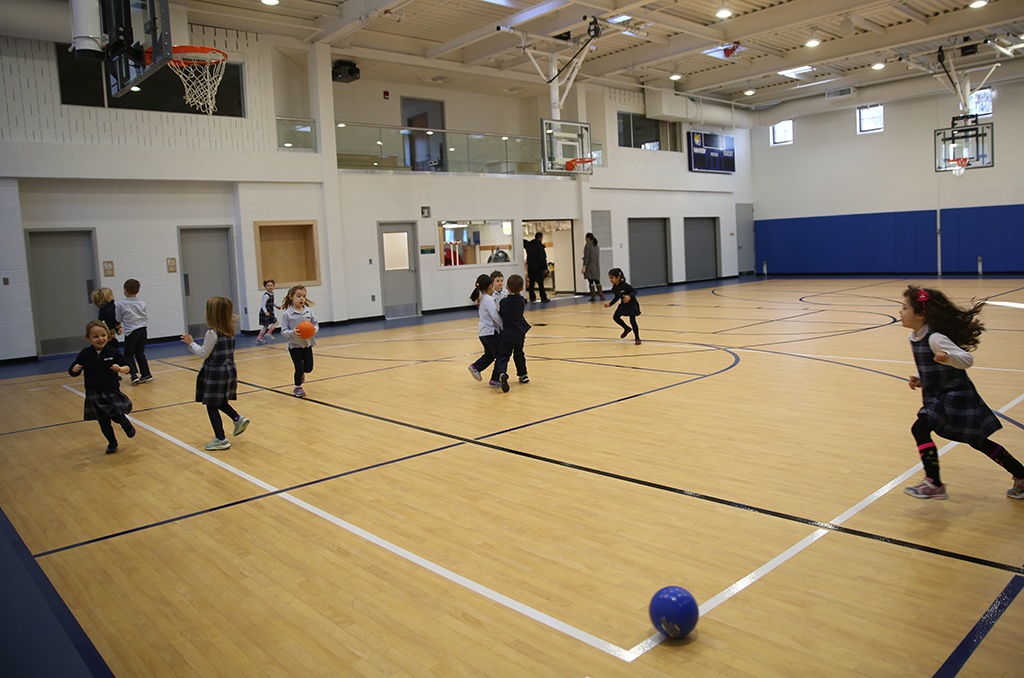
Students learn about movement and through movement in our Lower School Physical Education (PE) program. Our approach to PE helps stimulate children to grow – physically, socially, personally and emotionally. Skills are developed through a wide variety of physical activities, designed to ensure maximum participation by all.
PE is embraced as an opportunity to stimulate cooperation, teamwork, decision-making and problem solving. Our creative "adventure challenges" require groups to work together collaboratively in order to solve problems and accomplish a common goal. In "movement composition" students broaden their understanding of how physical activity can be used for the development of basic motor skills as well as how movement can be used to communicate feelings, emotions and ideas. In "games" students also learn to recognize the challenges presented by games, the importance of rules, and how they define the nature of a game. "Individual pursuits" and "health-related fitness" balance our PE curriculum with the development of basic motor skills and recognizing and appreciating the value of maintaining a healthy lifestyle.
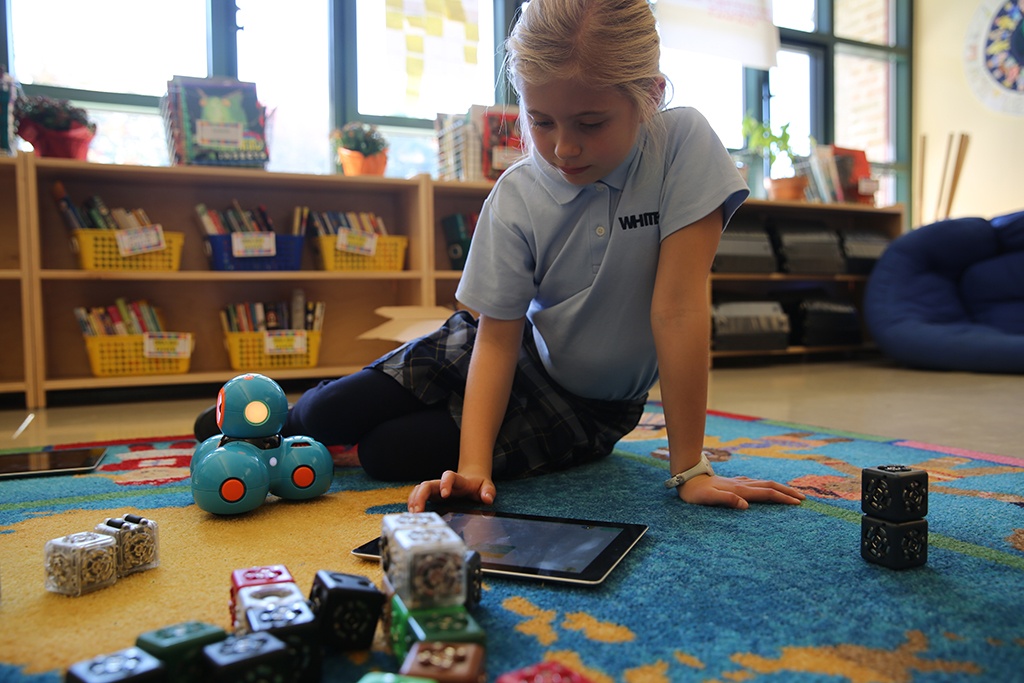
Your child will begin using a variety of educational hardware and software technologies in the Lower School to enhance their learning, support them in the inquiry process and to develop their conceptual understanding. Lower School students are all assigned Chromebooks for the entire school year to practice typing skills with Keyboarding Without Tears, reinforce key math concepts in ALEKS, create presentations in Google Docs, read eBooks with Follet and to learn coding in Scratch.
Students also have opportunities to use other educational technologies to extend their learning such as iPads, Cubelets, KIBO Robots and OSMO. We have adopted a flexible learning model that encourages collaboration and team teaching between the classroom teachers, the Librarian/Media Literacy Specialist and the members of the IT department in an effort to identify technologies that can be used to enhance, engage and support student learning.
Your child can continue their learning after the normal school day ends by enrolling in one of our fee-based enrichment and cocurricular program classes called WECCP (pronounced we-chip). The goal of the WECCP program is the same as during the academic day—to meet the spectrum of whole child development—cognitively, socially, emotionally and physically, focusing on the traits identified in the learner profile.
Students participate in a variety of school activities where children can learn from both Whitby teachers and highly skilled and experienced external instructors. As a student-centered school, Whitby encourages students to join and participate in a variety of activities where children can learn, explore new interests and make friends beyond the school day. Our activities are aimed at providing enriching experiences that build on individual interests and extend learning beyond the classroom, while supporting families who want an extension to the academic day.
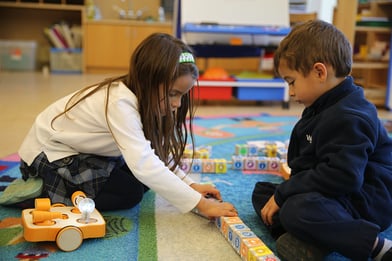
Browse the Cocurricular Brochure
Camp Whitby Wildcats: Grades 1-4 -- Learn More & Register Today
